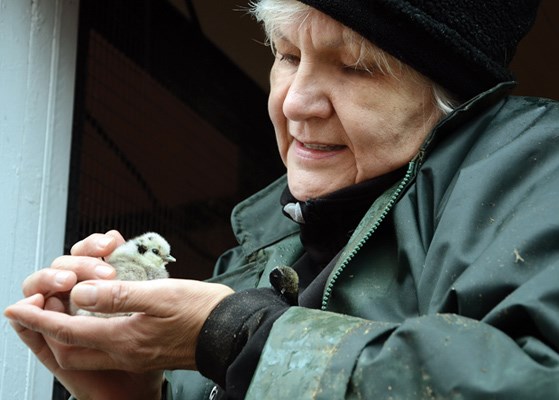THE City of North Vancouver is getting cracking on a new bylaw allowing residents to keep chickens.
Council voted unanimously to instruct staff to brood over the issue following a presentation Monday from the Canadian Liberated Urban Chicken Klub, or CLUCK.
Lianne Shyry told council her group has 25 chapters across Canada, and backyard chickenkeeping has seen success in Vancouver, New Westminster, Saanich, Portland, Victoria and New York.
"Chickens are pets as well as a wonderful egg source," Shyry said, adding that the birds could also further the city's goals in terms of sustainability, food security, education and community building.
"Chickens are gardeners," she said. "They will naturally deal with pests and weeds. They will eat just about anything you would put in your compost as well as aerate the soil. At the other end of things, chicken manure is high in nitrogen and is a highly regarded fertilizer sought after by gardeners. Because they are composters they will reduce municipal waste. Chickens are food producers - studies show that a happy chicken results in not only a better-tasting egg but actually a more nutritionally rich egg at an affordable price."
Shyry said chickens provide valuable insight for children and adults into where their food comes from as well as being enjoyable pets.
"What other pet delivers a return on your investment?" she asked. Chickens might not be the smartest birds in the shed, Shyry conceded, but their behaviour is entertaining.
Coun. Pam Bookham asked Shyry if chickens would attract predators, the main concern raised when a similar proposal couldn't take flight in West Vancouver in 2009.
Shyry said a coop won't necessarily attract other animals if the chicken feed is locked up, the coop is regularly cleaned and secured with sufficient wire mesh, including some underground to block burrowing creatures.
Maplewood Farm, she pointed out, has kept chickens near areas that bears and cougars and coyotes are known to frequent, without incident.
Bookham also asked if the city would become home to "feral chickens" if a resident decided the hobby wasn't for them after all. Staff confirmed the city has no capacity to keep chickens within its current animal control program.
Shyry's colleague Duncan Martin said previous proposals were held up while the SPCA built an expensive coop for runaway birds.
"It hasn't been used at all," he said. "People who don't want their chickens have the easiest time in the world finding a home for them because it is such a tight-knit community. I don't know if a chicken has set foot in that cage."
Martin also told council that the price of a premade backyard coop runs anywhere from $200 to $600 dollars, although some may choose to build their own from old pallets or other scrap materials. The only hard cost, he said, is the chicken wire. A flock of two to eight birds can be fed with table scraps or commercially produced feed, which runs about $10 per month. In return, the keeper would receive 18-20 eggs per week. These eggs may be offered to friends and neighbours, but could not be legally sold.
Maplewood Farm, said Shyry, would be an ideal place to offer courses for aspiring "hen guardians."
"My compliments to CLUCK," said Coun. Rod Clark. "I haven't been approached by a group as well organized in quite some time.
"Walking around in Lower Lonsdale, I won't say east or west," added Clark, picking his words with care, "there are chickens in the community now."
Coun. Craig Keating said staff should definitely examine potential health risks, but sponsored a motion to develop bylaws to allow backyard chicken coops.
"I just like saying cluck in council," Keating said. "Don't get mixed up," cautioned Mayor Darrell Mussatto, to widespread laughter.
"I'm often surprised there aren't more heritage buffs attending," continued Keating, "because 60, 70 years ago chickens were all over the place. It was normal. Somewhere in the '50s we adopted an urban agriculture strategy that said let's extinguish agriculture in the bounds of municipalities. . . . I can't wait to see chickens come to North Vancouver.
"It's part of our past, part of our present, and I'd like to see it be part of our future."



